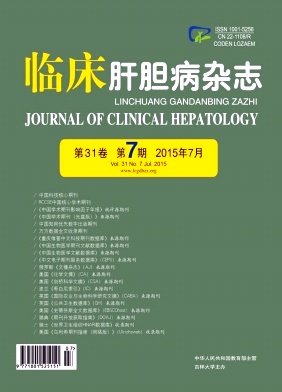| [1] | Runbing ZHANG, Tingting SHI, Yang WU, Jiucong ZHANG, Xiaofeng ZHENG. The mechanism of autophagy inducing drug resistance of hepatocellular carcinoma[J]. Journal of Clinical Hepatology, 2024, 40(11): 2315-2319. doi: 10.12449/JCH241128 |
| [2] | Yanhong BAO, Qiang WANG, Wenlong ZHANG, Na GE, Nan LI, Jun SU, Kexin LI. Ursolic acid in Hippophae rhamnoides L. inhibits hepatocyte apoptosis in rats with alcoholic liver disease by regulating mitochondria-cytochrome c[J]. Journal of Clinical Hepatology, 2023, 39(7): 1617-1626. doi: 10.3969/j.issn.1001-5256.2023.07.016 |
| [3] | Qianlan DAI, Shaoneng LIU. Role of autophagy in liver fibrosis[J]. Journal of Clinical Hepatology, 2021, 37(6): 1440-1444. doi: 10.3969/j.issn.1001-5256.2021.06.046 |
| [4] | Qiao WU, Pengfei YU, Yanzhen BI, Baozeng WANG, Zixuan WANG, Zhijie LI, Yu CHEN, Zhongping DUAN. Mechanism of Ganshuang granule extract in alleviating N-acetyl-p-aminophenol-induced hepatocellular injury[J]. Journal of Clinical Hepatology, 2021, 37(1): 120-125. doi: 10.3969/j.issn.1001-5256.2021.01.024 |
| [5] | Han ZhiWei, Wang ZongYu, Ju JiaNi, Li KeZhi, Wu GuoBin, Lin DongYi, Chen Chuang. Regulatory effect of water extract of Jianpi Xiaoji prescription on autophagy of human liver cancer SMMC7721 cells[J]. Journal of Clinical Hepatology, 2020, 36(3): 587-591. doi: 10.3969/j.issn.1001-5256.2020.03.023 |
| [6] | Wang YuLu, Xu XiaoYang, Yu XiaoHan, Ping Jian, Zhao ChangQing. Role of oxidative stress and autophagy in the development and progression of hepatocellular carcinoma[J]. Journal of Clinical Hepatology, 2020, 36(2): 426-429. doi: 10.3969/j.issn.1001-5256.2020.02.042 |
| [7] | Wu YanBin, Wang XueWen, Niu HongKai, Cheng Yu. Research advances in the role of protective autophagy in regulating vasculogenic mimicry formation in malignancies such as cholangiocarcinoma[J]. Journal of Clinical Hepatology, 2019, 35(8): 1882-1884. doi: 10.3969/j.issn.1001-5256.2019.08.053 |
| [8] | Wang MuQi, Li YaPing, Liu LaYang, Dang ShuangSuo, Shi JuanJuan, Jia XiaoLi. Role and mechanism of autophagy in development and progression of hepatocellular carcinoma and regulation of immunotherapy[J]. Journal of Clinical Hepatology, 2019, 35(5): 1129-1134. doi: 10.3969/j.issn.1001-5256.2019.05.045 |
| [9] | Gong Jing, Jie XinKe. Effect of endoplasmic reticulum stress and autophagy on hepatocyte apoptosis[J]. Journal of Clinical Hepatology, 2019, 35(12): 2828-2832. doi: 10.3969/j.issn.1001-5256.2019.12.041 |
| [10] | Yang YanHui, Zhang YuXiang, Gui Yang, Liu WeiFeng, Yang TianBao, Zhang YanTao, He ShaoJie, Sun JunJun, Fan Hua. Research advances in the role of autophagy and perineural invasion in pancreatic cancer[J]. Journal of Clinical Hepatology, 2018, 34(11): 2475-2479. doi: 10.3969/j.issn.1001-5256.2018.11.045 |
| [11] | Shi HongBo, Shi HongLin, Zhang XiangYing, Chen DeXi, Duan ZhongPing, Ren Feng. Protective effect of autophagy in mice with acute liver injury induced by D- galactosamine / lipopolysaccharide and related mechanisms[J]. Journal of Clinical Hepatology, 2017, 33(2): 329-333. doi: 10.3969/j.issn.1001-5256.2017.02.027 |
| [12] | Shi JingRen, Guo XiangHua, Wang JieLin, Wang ShanShan, Qiao LuXin, Chen DeXi. Effect of hepatitis B virus rtA181T mutation on autophagy of Huh7 hepatoma cells[J]. Journal of Clinical Hepatology, 2016, 32(11): 2107-2111. doi: 10.3969/j.issn.1001-5256.2016.11.020 |
| [13] | Zhang LiXia, Li Ying, Wang LiMing, Yan Xiang. Bone marrow mesenchymal stem cell transplantation via different approaches in treatment of liver cirrhosis in mice[J]. Journal of Clinical Hepatology, 2016, 32(10): 1906-1910. doi: 10.3969/j.issn.1001-5256.2016.10.016 |
| [14] | Zhu XueMin, Meng QingHua. Hepatocyte autophagy model established by physical method[J]. Journal of Clinical Hepatology, 2016, 32(8): 1566-1570. doi: 10.3969/j.issn.1001-5256.2016.08.027 |
| [15] | Wang WeiHao, Xu WeiHua. Roles of Nrf2 and autophagy in liver fibrosis[J]. Journal of Clinical Hepatology, 2015, 31(3): 447-451. doi: 10.3969/j.issn.1001-5256.2015.03.033 |
| [16] | Zhang FengXiao, Bai XueSong. Therapeutic efficacy of Ganshuang granules in treatment of hepatic fibrosis[J]. Journal of Clinical Hepatology, 2014, 30(4): 317-319. doi: 10.3969/j.issn.1001-5256.2014.04.008 |
| [17] | Huang LanYu, Xu LieMing. Relationship between liver diseases and autophagy[J]. Journal of Clinical Hepatology, 2014, 30(2): 186-188. doi: 10.3969/j.issn.1001-5256.2014.02.022 |
| [18] | Ding JianBo, Li XiuHui. Current perspectives on the role of autophagy in liver fibrosis[J]. Journal of Clinical Hepatology, 2013, 29(4): 305-307. |
| [19] | Guo JinSheng. Recent perspectives on mechanisms of liver fibrogenesis: microRNA and cell autophagy [J]. Journal of Clinical Hepatology, 2013, 29(5): 324-326. |
| [20] | Yin ShengJie, Zheng JinXin, Zhang Ting, Lu FengMin, Xu JingHang, Yu YanYan. Inhibition of diammonium glycyrrhizinate on mitomycin C-induced apoptosis in HepG2 cells via apoptotic pathway[J]. Journal of Clinical Hepatology, 2011, 27(7): 741-745. |













 DownLoad:
DownLoad: